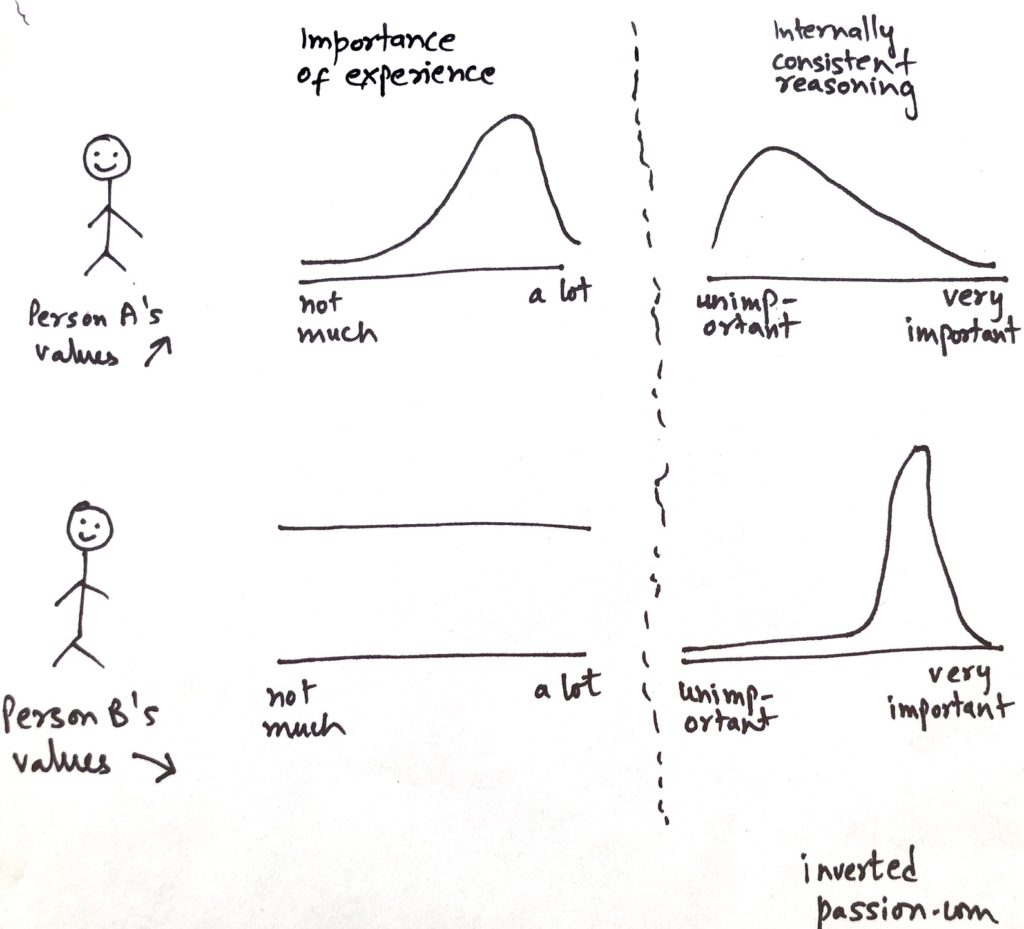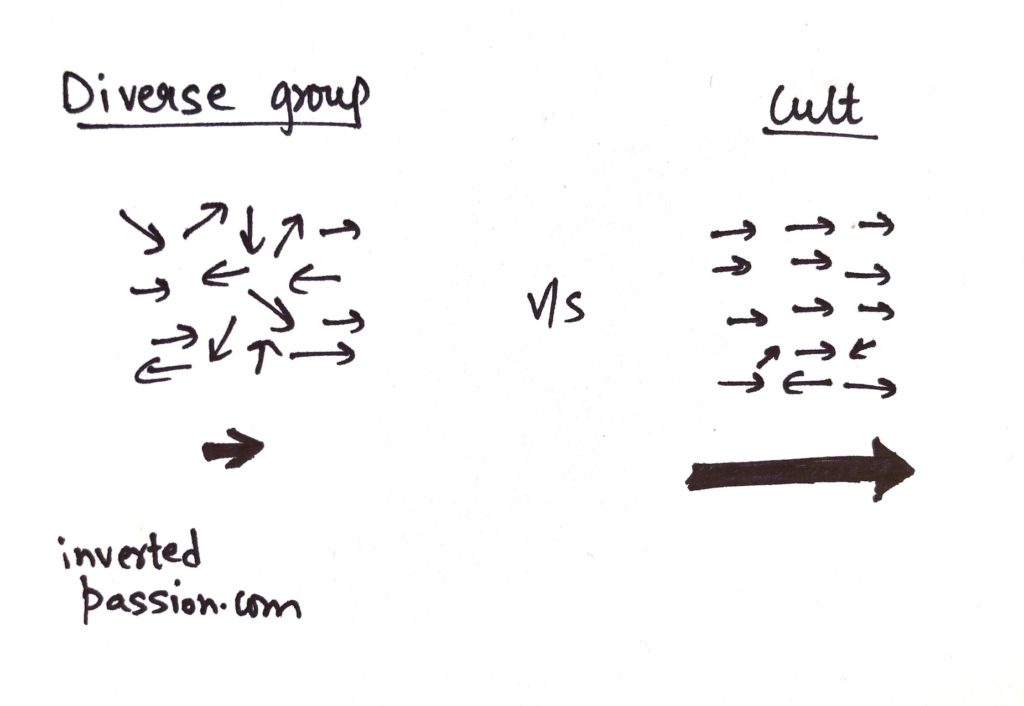Peter Thiel wrote in his book, Zero to One, that startups need to be cult-like. At that time, I didn’t completely appreciate his message, but now I do. By ‘cult’, I mean a group where members have values that are similar to each other, but extremely different from the outside world. Cults, as long as they don’t harm their members or others, are society’s exploration vessels. Because they’re cults, they obsess about arcane stuff that nobody else cares about. Most of the times, they keep it to themselves and rest of the world ignores them. But if they discover something valuable, rest of the world benefits.
All mainstream phenomenon originates in a cult. Veganism was once a cult, and so was the idea of US as a country. Science began as a cult when the Royal Society of London adopted Nullius in verba as its motto. By asking its members to “take nobody’s word of it”, Royal Society became attractive to certain people and extremely unattractive to other people. This cohesion of views is what laid the foundation of modern science’s growth from a startup to a major force of the world.
As you’ll see, this is what successful startups also need to be like.
Communication happens only when values are shared
The reason startups should aim to be like cults is because communication is impossible between people with different values. If you are someone who believes in “taking nobody’s word for it” and someone else has an unquestionable faith in God, no matter how hard both of you try, your communication is going to break at some point. Of course, you both may agree on surface-level, obvious facts (like “certain aspects of religious faith serve a useful purpose” or “marketing is important”) but this shallow agreement on facts that everyone knows doesn’t help. Startups are explorations into what’s non-obvious to society. Profits require creativity, doing things that others aren’t doing. And that requires seeing the world in a similar way.
Values are prior probabilities for preferences (is making money good?), values (should one work hard or aim for a work-life balance?), and thought processes (should disagreements be avoided or not?). People’s prior experiences and environment shapes up their values, and their application is context dependent. But someone who has a high probability of respecting authority isn’t going to thrive in a completely authority-less environment.

People usually agree on the data but they differ in its interpretation because of their values. This is troublesome because the same statement “we need to work on Saturdays to release this feature” can be interpreted as lets-do-it (if someone values speed or customer value) or cant-this-be-done-next-week (if someone values work-life balance).
Values change through experiences but take a non-trivial amount of time. It’s sort of like Bayesian updating. Someone who starts by having no opinion on work-life balance requires fewer data points about benefits and costs of work-life balance than someone who comes with a very strong view on it. Startups shouldn’t be a place that people join to update their priors (even though, ironically, startups are a place where many end up updating their priors). During early phases of a company, an entrepreneur cannot afford to waste time getting everyone to agree. The number of social interactions in a group increases exponentially with the number of people in the group. And each divergent set of values takes time to come to an alignment.

All this won’t be an issue if people, irrespective of their values, acted with the same intensity and passion. However, my experience has taught me the difference between compliance and commitment. In many cases, when we think someone is committed to our cause, they could simply be complying (especially if their salary or love or friendship depends on complying). Compliance is an acceptable outcome for large companies where the lack of full effort by one individual isn’t fatal, but for startups, a half-hearted effort has a big cost. In early days of a startup, you need the passion that comes from blind faith.
Note that I’m not advocating certain values over others. That’s for you to decide. Rather, what I’m advocating for is a cohesion of values in your startup.

If the similarity in values is so important for a small decision (like working on a Saturday), imagine how important it is for startup’s raison d’etre. If your early team isn’t convinced that the world will be a worse place without your products or services, they simply won’t put the passion and energy required to make it happen. As an entrepreneur, you require people who have the very similar crazy-view about reality as you have. Of course, all of you could be wrong together (and that’s why startups fail). But you’ll at least spend your energy on customers and market finding whether your problem-solution pair is valuable or not. Versus, spending your energy in internal “alignment”.
Hiring for cults
People hire people like them. What this means is that an entrepreneur needs to be extremely careful in picking early employees. Hire someone with different values and they’ll hire people like themselves. Pretty soon, your company will be a heterogeneous group that consumes all your energy in getting to an alignment.
This is why, entrepreneurs during hiring should weigh less on experience or skill (these can be acquired), but weigh a lot more on values. For example, what’s disastrous to a startup is getting a genius who’s rude when everyone else values respect (or vice versa). In this scenario, as a CEO, you’ll find your energy consumed by telling the genius to tone down while telling others to be OK with a little bit “directness”. This is a big waste of time and energy for an entrepreneur. I hate getting adults to “align”.
So, during interviews, focus on asking questions that reveal a person’s worldview. My personal favorite question is to ask a person whether s/he believes in God or not. My intention isn’t to select atheists (we have many believers in Wingify). Rather, I want to understand the thought process behind people’s deepest beliefs. whether they allow for reasonable doubts and how open are they to changing their mind when presented with new logic or data.
The beauty of hiring for similar values early on is that after a while, it becomes self-sustaining. If the early team is homogenous, they will keep on hiring people who’re like them. So, as your company scales, you have to worry less about this. In fact, because of homogeneity, as the company grows, your problem becomes of diversity (not sameness). Cults become detrimental later (see The Uber Dilemma) but early on, they’re absolutely required.
What about diversity?
I’m not advocating hiring for clones. Diversity is useful, but only as long as it’s diversity of the right kind. An entrepreneur will gain tremendously from the diversity of experiences in his/her team. All past experiences are useful data points. In a homogenous group with similar values, varying experiences enriches everyone. What someone else knows and you don’t is valuable. The perfect combination of a group composition is of different experiences but similar values.
However, this is hard to find because people’s experiences shape their values. So, for example, in my experience, I’ve found that when a salesperson says “it’s worthwhile to travel and meet an important customer in person”, s/he is not able to explain the reasons behind it and so an engineer-founder who values clear reasoning will not agree with the salesperson. The salesperson will end up feeling the founder “doesn’t get it”. I realized the importance of meeting customers in person years after it was told to me. If only someone had linked it to evolutionary biology, which says being around someone is more trust building than being away. (Had it been someone else than me, who values experience for its own sake, the decision to “meet an important customer” would have been made sooner and less time would have been wasted. That’s what I mean by “cult”.)
If you’re able to find someone with different experience than you but has a very similar worldview, hire them immediately. But beware of going for diversity without understanding what kind of diversity you are creating. Just like not all social networks are created equal, not all diversity is created equal. Differences matter.
What’s YOUR favorite hiring question?
Now that you’ve read the article, I have a question for you.
What’s your favourite hiring question?
I’ll RT interesting questions.
— Paras Chopra (@paraschopra) January 13, 2018
What questions do you use when hiring? Tweet your response to me as a reply to this thread and I’ll retweet the most interesting examples. In the same thread, you can also check out and comment on what others proposed. (There are some really interesting ones in the thread, so do check the thread).
Join 200k followers
Follow @paraschopra